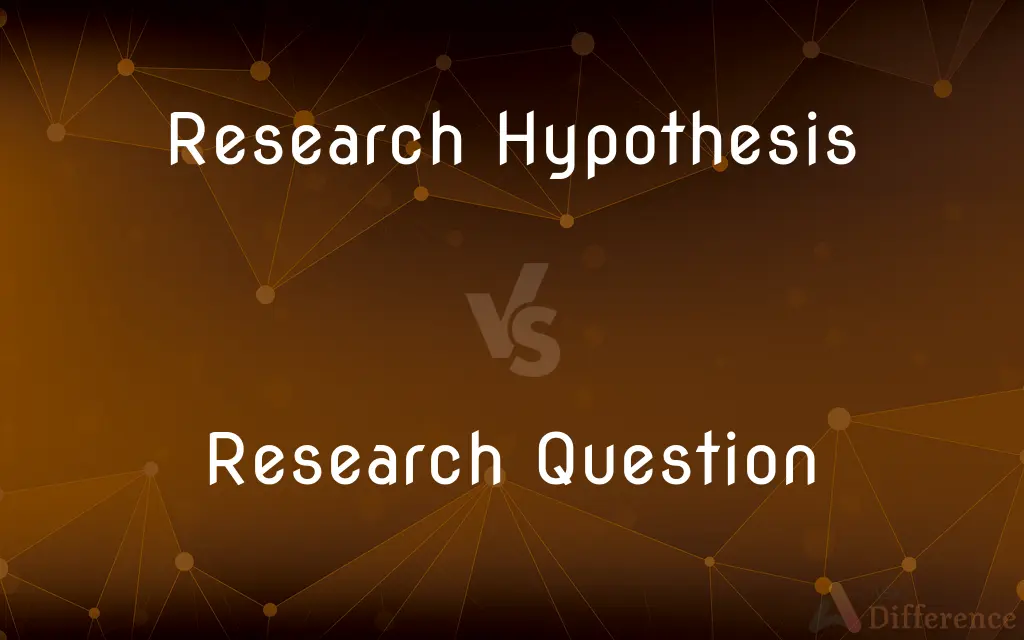Research Hypothesis vs. Research Question — What's the Difference?
Edited by Tayyaba Rehman — By Fiza Rafique — Published on December 25, 2023
A Research Hypothesis is a testable prediction about a study's outcome; a Research Question seeks to explore an aspect of a topic without assuming an outcome.

Difference Between Research Hypothesis and Research Question
Table of Contents
ADVERTISEMENT
Key Differences
A Research Hypothesis is fundamentally an educated guess about the outcome of a study. It is framed as a clear, testable statement based on previous research, theories, or observations. Conversely, a Research Question is posed when a researcher is beginning to explore a topic and aims to gather information without making a definitive prediction about the results.
Diving deeper, a Research Hypothesis can be seen as an extension of existing knowledge. It's an assertion that requires validation through empirical data. The Research Question, however, starts from a point of curiosity and is designed to open up an area of inquiry rather than predicting the nature or direction of the findings.
In practice, a Research Hypothesis typically takes a declarative form and often includes variables that are to be tested. For instance, "X will cause Y." On the other hand, a Research Question is structured as a question and does not contain a prediction. It seeks to understand, describe, or explore a topic.
From a methodological perspective, a Research Hypothesis is utilized in experimental or quasi-experimental research designs where manipulation or control can be exerted. The outcome can either support or refute the hypothesis. A Research Question, on the contrary, is often employed in exploratory, descriptive, or qualitative studies where the primary aim is to understand or describe rather than to predict.
While both are integral to research, their purposes differ. A Research Hypothesis is pivotal in guiding the direction of the study and determining the methods used. The Research Question serves as the foundational inquiry that defines what the researcher aims to discover, often without preconceived notions of the outcome.
ADVERTISEMENT
Comparison Chart
Nature
Testable prediction
Inquiry without assumption
Form
Declarative statement
Posed as a question
Purpose
To predict an outcome
To explore or understand
Associated Research Type
Experimental or quasi-experimental
Exploratory, descriptive, or qualitative
Outcome
Can be supported or refuted
Generates understanding or description
Compare with Definitions
Research Hypothesis
An outcome-driven proposition in research.
The Research Hypothesis assumed that exercise frequency correlates with heart health.
Research Question
An inquiry exploring a topic's aspect.
The Research Question asked how diet influences mood.
Research Hypothesis
An educated guess requiring empirical validation.
The Research Hypothesis suggested that diet affects memory retention.
Research Question
An open-ended probe without assumed results.
The Research Question focused on the reasons behind migration patterns.
Research Hypothesis
A declarative statement involving variables.
The study's Research Hypothesis was that caffeine consumption enhances cognitive functions.
Research Question
A foundational query guiding research.
The study began with the Research Question of what factors influence job satisfaction.
Research Hypothesis
A testable prediction about a study's result.
The Research Hypothesis posited that increased sunlight exposure would boost plant growth.
Research Question
A curiosity-driven interrogation in studies.
The Research Question sought to understand the cultural impacts of globalization.
Research Hypothesis
An assertion about potential study outcomes.
The Research Hypothesis proposed that reduced screen time would improve sleep quality.
Research Question
An exploration tool in qualitative research.
The Research Question delved into the lived experiences of remote workers.
Common Curiosities
What is the main purpose of a Research Hypothesis?
A Research Hypothesis provides a testable prediction about a study's outcome based on prior knowledge or observation.
Is a Research Hypothesis always proven correct?
No, a Research Hypothesis can be supported or refuted based on the study's findings.
How is a Research Question different from a Research Hypothesis?
A Research Question explores a topic without assuming an outcome, whereas a Research Hypothesis makes a specific, testable prediction.
Can a study have both a Research Hypothesis and a Research Question?
Yes, a study can start with a Research Question and, based on initial findings, develop a Research Hypothesis.
Which is typically used in qualitative research: Research Hypothesis or Research Question?
Qualitative research often begins with a Research Question to explore or understand a topic deeply.
Why is it important to have a clear Research Hypothesis?
A clear Research Hypothesis guides the research direction, methodology, and interpretation of results.
Can a Research Question evolve over time?
Yes, a Research Question can evolve as the researcher gains more insight or as the study progresses.
Is a Research Hypothesis exclusive to experimental studies?
While commonly used in experimental research, a Research Hypothesis can be part of any study type where predictions are made.
How is a Research Question formulated?
A Research Question is formulated based on gaps in existing knowledge, curiosity, or specific research objectives.
Can a Research Question lead to the formulation of multiple hypotheses?
Yes, a single Research Question can lead to the development of multiple Research Hypotheses addressing various facets.
Which comes first in the research process: Research Hypothesis or Research Question?
Typically, a Research Question comes first and, based on initial exploration, a Research Hypothesis might be formulated.
Can a rejected Research Hypothesis still be valuable?
Yes, even a rejected Research Hypothesis provides valuable insights and can guide further research.
Can there be multiple hypotheses in a single study?
Yes, a study can have multiple Research Hypotheses addressing different aspects or variables.
Is every Research Question answerable?
Ideally, a Research Question should be answerable, but complexities or limitations might prevent conclusive answers.
Why is it essential to have a well-defined Research Question?
A well-defined Research Question gives direction to the study, ensuring it remains focused and relevant.
Share Your Discovery

Previous Comparison
Epigeal Germination vs. Hypogeal Germination
Next Comparison
Maid of Honor vs. Matron of HonorAuthor Spotlight
Written by
Fiza RafiqueFiza Rafique is a skilled content writer at AskDifference.com, where she meticulously refines and enhances written pieces. Drawing from her vast editorial expertise, Fiza ensures clarity, accuracy, and precision in every article. Passionate about language, she continually seeks to elevate the quality of content for readers worldwide.
Edited by
Tayyaba RehmanTayyaba Rehman is a distinguished writer, currently serving as a primary contributor to askdifference.com. As a researcher in semantics and etymology, Tayyaba's passion for the complexity of languages and their distinctions has found a perfect home on the platform. Tayyaba delves into the intricacies of language, distinguishing between commonly confused words and phrases, thereby providing clarity for readers worldwide.










































